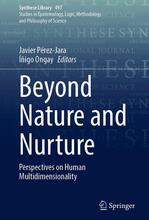CCS Faculty Fellow Javier Pérez-Jara shares the recent publication of his book, coedited with Íñigo Ongay (Deusto University), Beyond Nature and Nurture: Perspectives on Human Multidimensionality, just released by Springer Synthese.
Javier is thrilled to be presenting the book soon at the University of Tokyo!
Here’s a quick overview of the book:
Beyond Nature and Nurture brings together several leading scholars in the longstanding nature–nurture debate to lay the groundwork for a productive dialogue among biologists, psychologists, social theorists, and philosophers. Specifically, while criticizing the blank-slate hypothesis, the contributors show how cultural structures and social interactions actively shape and transform certain biological features that were once considered immutable. The book also highlights some of the moral and political consequences of different perspectives within the nature vs. nurture debate. Through updated scientific and philosophical theorizing, the chapters in this book aim to overcome—once and for all—the simplistic yet persistent opposition between nature and nurture, offering a far more complex and dynamic—yet richer and epistemologically manageable—picture of the human being. The structure is divided into two complementary parts: “Part I. The Nature vs. Nurture Debate”, and “Part II. Case Studies in the Nature vs. Nurture Debate”.
In addition to his role as coeditor, Javier contributed a chapter titled “Cultural Sociology and the Relative Independence of Culture: An Ontological and Epistemological Analysis.” In that chapter, he proposes a philosophical framework to substantiate cultural sociology’s assertion of the relative autonomy of culture.
Chapter abstract: This chapter examines ways to transcend simplistic and reductive perspectives on the nature vs. nurture debate by analyzing one of cultural sociology’s central theses: the relative independence of culture. The degree to which culture is contingent upon social structures and natural processes distinguishes cultural sociology from various forms of reductionism and determinism. At the same time, its emphasis on culture’s relative independence differentiates it from cultural idealism. This chapter focuses on the primary ontological and epistemological assumptions and implications underlying the thesis of culture’s semi-autonomous power. To support this exploration, I propose a philosophical framework addressing key concepts such as upward and downward causation, ontological and epistemological discontinuities, asymmetries, and emergence. I argue that the relationships between biological and cultural factors form a subset of broader interactions within the asymmetrical and dynamic multidimensionality of human existence, which itself represents a specific instance of the universe’s overarching asymmetrical multidimensionality.
